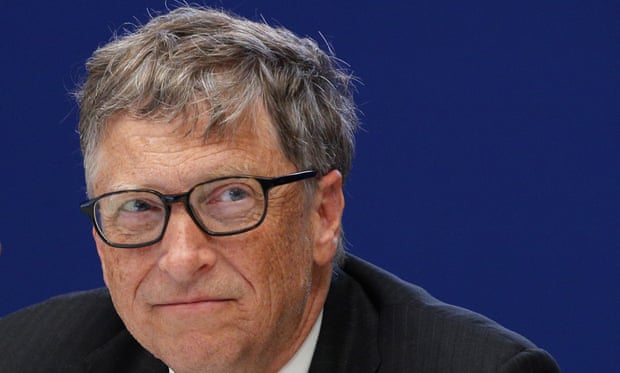Will Bill Gates and his billionaire friends save the planet?
We don’t need the miracles that Gates’ new clean-tech fund promises – we need to take back democracy from the super rich
Not to worry, the world’s richest philanthropists are on the case. As the United Nations climate talks kicked off in Paris amid worries that governments aren’t committing to serious emissions reductions, Bill Gates stole the spotlight with a bold promise to usher in a clean-tech future.
Gates is the new public face of Mission Innovation, an initiative of twenty governments, including the US and India, pledging to double their spending on future clean tech. And because government research is “not enough,” Gates also launched the Breakthrough Energy Coalition, a parallel plan with billionaires like Richard Branson and Mark Zuckerberg to spark big technological solutions, while making a buck on the side.
And what of the wave of decentralized green energy, based on existing technologies, already spreading through several countries? Gates has long made the argument that “today’s tools” are incapable of slashing emissions. He scoffs at technologies like rooftop solar; they’re “cute” and “uneconomic.” The costs of relying on them, he claims, would be “beyond astronomical.”
Except that’s just not true. The latest research on how to rapidly transition to 100 percent green energy shows we don’t to wait for some kind of third-generation miracle tech. Already, renewable prices have dropped at an incredible rate (even though governments have provided scant support while continuing to shovel billions at fossil fuel corporations). The most impressive progress has happened in countries like Germany and Denmark, where locally-owned wind and solar co-ops have led the way, creating jobs and greater community control over energy.
Then, of course, there’s fighting poverty—Gates’ favourite recreational activity. For the poorest communities without electricity, the flexibility of small-scale wind and solar is critical. Continuing to rely on centralized grids and large scale power plants will mean energy is too costly and inaccessible—keeping “a billion people in the dark,” experts warn. And by shutting frontline communities out of the conversation, Gates’ message is perfectly in keeping with the spirit of the Paris climate talks so far—even as it’s profoundly at odds with the stated aims of his charitable ventures.
And whether it’s India or North America, the green energy transition will never happen fast enough without mobilizing broad-based coalitions of people who stand to benefit. Putting control over energy in the hands of local communities is not only just—it’s necessary.
So is it really a theory of technological change that makes Gates grumble about “cute” solar panels? Or is there something about politically empowered poor people supplanting profit-gouging corporations that rubs him the wrong way?
At the end of the day, Gates’ allegiances are clear. By his own admission, he wants governments to lay the groundwork for a new frontier of green profit-making, then get out of the way.
And he doesn’t seem to have considered the possibility that robust public investment could drive change in a different way—whether in health care, education, as with his past philanthropy, or energy and transportation. If governments are going to spend billions of dollars getting us off fossil fuels—and they should—then that money would be better spent investing in the public sphere based on existing technologies. That would not only mean rolling out wind and solar, but also drastically expanding publicly owned and affordable public transit and local sustainable agriculture.
And it’s no mystery how we might raise the money for these investments: through taxes on the billionaire class, the same men now presenting themselves as our planetary saviours.
If his past record is any indication, the kind of projects Gates will go to bat for have one defining feature: they hold out the hope that corporations can continue their business model undisturbed. Projects that are unproven, high-risk and require lucrative long-term subsidies from governments. Like carbon capture and storage (CCS), or a new variant known as Bio-energy with carbon capture and storage (BECCS)—climate quick-fixes that promise we can keep burning fossil fuels. Gates has also put millions into funding geoengineering techniques—like spraying the stratosphere with sulphate to block the sunlight—that would manipulate the global climate in order to counteract warming.
In contrast to the tried-and-true path of the redistribution of wealth and public investment, such gambits tend to be expensive boondoggles (and in the case of geoengineering, a massive risk to the food and water security of billions of people, who just happen to be in the poorest countries of the global South).
Gates, like most of the world’s wealthiest people and governments, want to believe we can find miracles. But we don’t need a miracle—we need to take our democracies back from the billionaire class.
So make no mistake about this initiative: it is an attempt to hijack the real solutions that movements outside the conference halls in Paris are attempting to make known. Indeed, by pitching in with Gates, twenty of the world’s richest governments couldn’t have been clearer about their desire to let corporations drive the climate agenda.
A civil-society backed transition to a more just and ecological economy is the best hope we have of averting catastrophic climate change. With or without Gates, that’s the kind of breakthrough we need.
On twitter: @Martin_Lukacs





Geen opmerkingen:
Een reactie posten